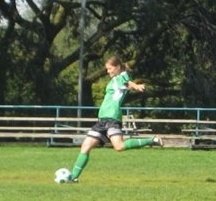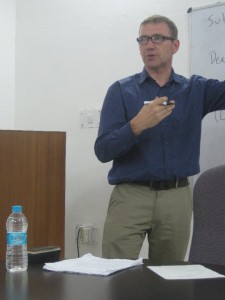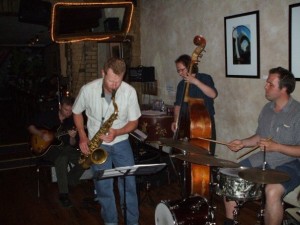We often have a sense of pride in a product that we have made, and the effort we put into forming the thing gives us a sense of ownership.
 After years of practice with the soccer ball and the playing field, I feel on the “inside” of soccer, I feel that soccer is “my thing.” And, indeed, looking on at the performance of a great player, we sometimes say “he owned it.”
After years of practice with the soccer ball and the playing field, I feel on the “inside” of soccer, I feel that soccer is “my thing.” And, indeed, looking on at the performance of a great player, we sometimes say “he owned it.”
When we study a foreign language, it is initially an alien system, and we cannot express ourselves in it; with our native “tongue,” however, the language we deploy—whether we are great poetic artists or just everyday speakers—expresses our meanings, and our words are no longer an alien medium, but a site where we encounter ourselves: through our long and intimate history of learning the language, we have “earned” the right to call our words our own.
And, of course, when we labour on the natural world to build or to harvest growth, or when we use our highly cultivated skills to make, lead, sell, manage, or teach, we proudly think of ourselves as having earned our daily bread, our wages, our popularity, our bonuses.
What is it, though, to earn?
Typically, we would distinguish what we earn from what we inherit or what we receive as a gift: we do not say that we have earned that which comes to us through the power of another. The son of Joe Kennedy did not earn the financial and political empire that he inherited from his father any more than Adam earned the right to be the first man. Similarly, I did not earn my blue eyes nor you your beautifully proportioned body. I did not earn the political freedom I was born into nor you the common knowledge that the world is round (actually, an oblate spheroid) and that women are equal to men—indeed, had you been born in a different era, you would have inherited different views, which you would consider equally compelling.
I did not earn my naturally healthy body any more than the person born lame earned a crippled position. And, just as I did not earn the body, I did not earn its attendant ability to move gracefully. When I become a smooth, swift runner, I am thus enjoying capacities I received and not “making myself a runner.”
Is there earning in this running? To be sure. Given the powers I have, I show who I am by how I take those powers up. What I earn is the right to be recognized as a good or bad pilot of powers that occur on their own, a good or bad caretaker of capacities that rely on my taking them up in order to be realized.
When I win at soccer, then, I should be a bit cautious in what I take pride in. No doubt I should be pleased that (because of my good upbringing) I had the emotional resources to stick to my plans and train daily. No doubt I should be pleased that I deployed my native intelligence to make good decisions about how to practice. But rather than becoming too thrilled with the greatness of my talent, I should give thanks that I was, at birth, the lucky recipient of a well-formed body with a strong heart and a large brain. –And, indeed, if I forget this and wrongly imagine my soccer skills to be “my” ability, I will get a nasty surprise one day when I wake up and find that the body that gives me those powers has become sick or aged, and no longer affords me those powers upon which I have been relying.
 And similarly, too, with our language. My eloquence, my charming style, my clarity, or, indeed, my capacity to compose provocative, oracular utterances—these are all “mine” by the grace of language. That this is a gift of my body is made clear in the aphasia brought about by a stroke; but even without such a bodily collapse, I may find that “my” language fails me, that I have lost my “gift” of speaking well. Language works in its own way, and I, like a surfer, can sometimes ride its crest, but it is the powers of language, with their own system and history, that I am thus privileged to deploy, powers that inspire me, but that I neither crafted nor understand.
And similarly, too, with our language. My eloquence, my charming style, my clarity, or, indeed, my capacity to compose provocative, oracular utterances—these are all “mine” by the grace of language. That this is a gift of my body is made clear in the aphasia brought about by a stroke; but even without such a bodily collapse, I may find that “my” language fails me, that I have lost my “gift” of speaking well. Language works in its own way, and I, like a surfer, can sometimes ride its crest, but it is the powers of language, with their own system and history, that I am thus privileged to deploy, powers that inspire me, but that I neither crafted nor understand.
And finally, then, our labour and its economic reward. All social life depends upon a division of labour, wherein individuals working on particular tasks pool their distinct efforts in a social collaboration of mutual support. In any life other than the most solitary life of struggling with nature, we depend upon the efforts of others to get by. We contribute our efforts and receive our rewards according to the character of the particular system of the division of labour in which we live and work.  Those who offer their services as sign painters, for example, command a notably smaller economic reward for their labours now that those who contributed those same labours 70 years ago, though the labours performed are identical. What we earn is not a simple effect of what we do, but is the effect of the placement of what we do in an economic system. And the economic system in which we work is something we inherit.
Those who offer their services as sign painters, for example, command a notably smaller economic reward for their labours now that those who contributed those same labours 70 years ago, though the labours performed are identical. What we earn is not a simple effect of what we do, but is the effect of the placement of what we do in an economic system. And the economic system in which we work is something we inherit.
Whatever economic power we deploy, then, is the power afforded us by a system, which is itself a system founded on the cooperative labour of all. What we “earn” is not our doing, but (a) the doing of the labour of all, and (b) the doing of a system of organization and distribution of that labour and its results.
The economic system might be compared to a jazz band. The saxophonist performs a “solo,” and “her” Db note sounds great, but it sounds great because of what the bass player, the pianist, and the drummer are playing behind and around her. The good saxophonist doesn’t “make” a great solo: she rides and directs well a wave on which she is surfing, an ocean of music she inherits from the rest of the band, from the tradition of jazz, and from the whole history and nature of music as such.
 It is with an attitude of humility and respect that the saxophone soloist will properly appreciate her “earnings”: she will recognize her cooperative role in a system—an organized group of musicians to whose activity she contributes powerfully and formatively, but upon whose activity she depends and whose contributions make it possible for her to have the role that she has. It is this same attitude that we should have as we try to calculate our economic earnings. None of us “earns” her economic rewards for him- or herself: each of us receives what we do through the power of an economic system that controls the distribution of the collective resources of all. Calculating our earnings properly means recognizing accurately what we owe to those others who are responsible for making our situation what it is.
It is with an attitude of humility and respect that the saxophone soloist will properly appreciate her “earnings”: she will recognize her cooperative role in a system—an organized group of musicians to whose activity she contributes powerfully and formatively, but upon whose activity she depends and whose contributions make it possible for her to have the role that she has. It is this same attitude that we should have as we try to calculate our economic earnings. None of us “earns” her economic rewards for him- or herself: each of us receives what we do through the power of an economic system that controls the distribution of the collective resources of all. Calculating our earnings properly means recognizing accurately what we owe to those others who are responsible for making our situation what it is.


 Participants in these
seminars consistently have the experience of growth in their conversation and
conceptual abilities, and typically leave with a transformed sense of the nature
and possibilities of philosophy.
Participants in these
seminars consistently have the experience of growth in their conversation and
conceptual abilities, and typically leave with a transformed sense of the nature
and possibilities of philosophy.





2 Comments
“Is there earning in this running? To be sure. Given the powers I have, I show who I am by how I take those powers up. What I earn is the right to be recognized as a good or bad pilot of powers that occur on their own, a good or bad caretaker of capacities that rely on my taking them up in order to be realized.”
I really appreciate the idea that as individuals we are “pilots” of powers that we cannot take credit for, and that our individuality is constituted by the ways in which we cultivate and express these natural and cultural gifts. I also appreciate the idea that it is precisely as such “pilots” that we are “caretakers”: the ways we live out our “own” capacities are also the ways that possibilities belonging to the world itself are made manifest. We depend on our inherited powers for our individuality, and our inherited powers “depend” on us for their own continual realization. To claim private ownership of these powers is thus a lie on two fronts: it misunderstands the individual’s reliance on what she did not herself make, and it misunderstands the imperative to live out inherited possibilities not for the sake of merely personal property or credit, but for the sake of the things themselves (language, sport, music, economic well-being, etc).
I have to teach Heidegger in five minutes (Question Concerning Technology), so I thought I’d come read this blog post again to get myself in the mood. Thanks. : )